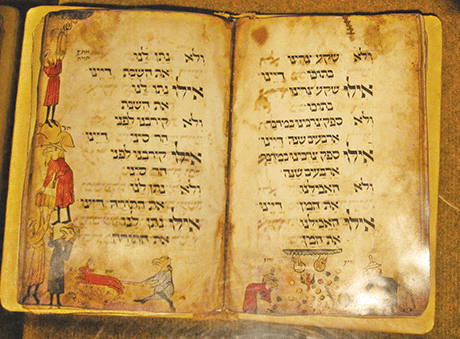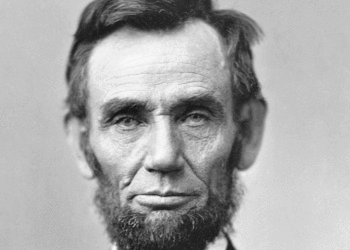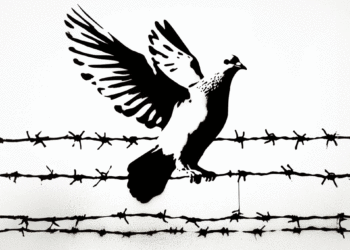By JOHN OSTFIELD
“Let all who are hungry come and eat.” This is what we say very early in the Passover seder. This year especially the question has to come to mind: Do we really mean it or is this just an annual ritual that we go through before joking that “they tried to kill us and didn’t succeed, so let’s eat!”
If we really mean what we say as we quote the Haggada, we then must wonder how it is possible for us to celebrate our liberation while less than a day’s flight away from us our fellow Jews are imposing a famine in Gaza. How can we as Jews, let alone as human beings, accept this as it is broadcast before our eyes daily on television?

Journalist and author Masha Gessen compared Gaza to the Warsaw Ghetto. I believe it is an apt comparison. Currently the population density of Rafah, in the southern Gaza Strip, is higher than it was in the Warsaw ghetto at its worst. We have to remember that before people were deported from Warsaw to death camps they were dying in the thousands from disease and malnutrition because the Germans controlled the entry of all goods into the ghetto.
Israel has controlled the entry of all goods into Gaza for years. We are at the beginning stages of a mass death phenomenon in Gaza. In addition to the bombs and rockets, people are starting to die from starvation and disease.
Some blame the Palestinians and Hamas in particular for this carnage and offer the simplistic solution of “Well, they could just surrender.” The truth is the Palestinians tried that in the Oslo Accords of 1993. That was a Palestinian surrender. They were willing to give up 78 percent of historic Palestine for a state in the remainder. That was not enough for the settlers; they went to war against the peace agreement as soon as they could. As a result, Hamas struck back inside the Green Line. That did not happen until after the Ramadan Massacre, which was on Purim in February 1994, only a few months after the original agreement was signed on the White House lawn.
Now the settlers are in charge. They have created the one state reality that they always wanted. It is of course one that depends on the violence of occupation, the continuing Nakba, and now the beginnings of genocide.
What do we do with this? How do we conduct our seders?
One of the most familiar parts of the seder is the song “Dayenu,” a recitation of our gratitude for the blessings that went from the departure from Egypt to settling in the Promised Land. “Dayenu” can have another meaning as well: enough! I believe we need to revise that song to fit the realities of today. I believe that we should have a new chant, asking why we didn’t say, “Dayenu.” Why didn’t we say, Enough?
When the first Zionist emissaries to Ottoman Palestine reported back that although the bride was beautiful, she was already taken, we didn’t say, Dayenu!
When Zionist leaders were more than happy to be willing fools for British colonialists and allowed Zionist self-defense forces to be trained and used by the British in anti-colonial warfare, we didn’t say, Dayenu!
When establishing the state of Israel allowed the Zionists to displace a majority of the existing inhabitants in the country (the Nakba) and those who were not exiled placed under military rule, we didn’t say, Dayenu!
When Israel cooperated with Britain and France in their failed attempts to maintain their imperial positions in the region, we didn’t say, Dayenu!
When after 1967 the Israeli government started making unilateral moves that have in the end prevented the establishment of a Palestinian state that was called for in the 1947 partition resolution, we didn’t say, Dayenu!
When the settler movement started gathering strength and created the Jewish Underground that murdered Palestinians, and within five years they were all pardoned and out of prison, we didn’t say, Dayenu!
When the settler movement destroyed the Oslo peace process that was our last best chance for a real two-state solution, we didn’t say, Dayenu!
When Israel decided to wall off Gaza and to impose a blockade on it that allowed every few years to send in the Air Force and sometimes the Army, whose role one general said was to “mow the grass,” we didn’t say, Dayenu!
When Israel and its apologists abroad created a hasbara (propaganda) system that defined what was permissible discussion about Israel in the Jewish community and in the wider one as well, we didn’t say, Dayenu!
When hasbara hasn’t been enough, blacklists, shaming and driving away critical voices from the Jewish community has become the norm, we didn’t say, Dayenu!
And now finally in a war that was started after a horrible terrorist attack that does not justify what is the beginning of genocide, we must scream, Dayenu!
Enough already — we cannot be silent. Not in our seders, in our synagogues, nor our families. This is the crisis of our moment, and it will define us forever. If our leaders choose to ignore these calls and pretend they don’t exist, or to try and shame and blacklist those who make those calls, we need to find a way to tell this truth.
Maybe this way we can truly call for “next year in Jerusalem” — in a city of justice and peace. A Palestinian lawyer in Jerusalem reminded me that in the Talmud it says: “truth, justice, peace.” We must tell the truth to establish justice, and only then we will have peace.
Dayenu!
***
John Ostfield lives in St. Paul.



















